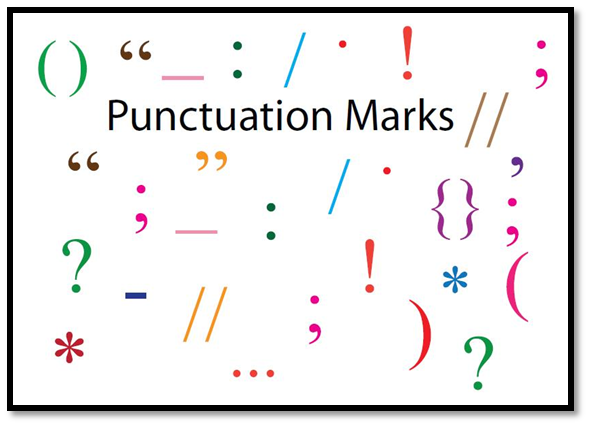English is a language that makes use of punctuations for clear and effective writing as well as reading. However, many of us often tend to forget the fundamentals and look beyond punctuations and their relevancy. Nonetheless, you never know when a situation turns up that requires you to write a great paper for one of your classes, or you need to submit a well-polished proposal to your boss; that's when you will learn and understand the importance of punctuation marks in the English language.
About punctuations and their rules:
It is important for you to understand the basic rules behind some of the most common punctuation marks as that would strengthen your understanding of English grammar.
Basic rules of punctuations:
Rule #1. Punctuations help end your sentence (.) (?) (!)
> One of the most commonly used punctuation marks in English has got to be a period or a full stop. (.)
Example- It's time to take the ecofriendly path and embrace green living.
> A sentence can also end with a question mark (?), when there is an inquiry or interrogatory remark.
Example- Isn't it high time that all of us embrace green living?
> Another punctuation that can be used to end a sentence is an exclamation mark (!), which suggests excitement or emphasis in a sentence.
Example- It's amazing, how much their family has embraced green living!

Rule #2. Know the difference between a semicolon (;) and colon (:)
> A semicolon (;) is used to separate two related yet independent clauses.
Example- People are worried about the future; our failure to conserve forests has put the world to a risk.
> The colon (:) on the other hand has a number of uses.
1. A colon (:) is usually used to introduce a list. A common instance is while using the word 'follows' a colon generally comes into play.
Example- The list of the best dietary foods is as follows:
2. A colon (:) is used only after a full sentence that ends in a noun.
Example- We had to choose between three options: to repeat the exam, to leave the school or to fail the class.
Rule #3. Understand when to use a single apostrophe/ single quotation (') and double apostrophe/ double quotation (")
> A double apostrophe (") is used to quote an individual.
Example- "I can't wait for the rock concert!" Jayesh exclaimed.
> A single quotation (') has various uses.
1. You can use a single apostrophe (') with the letter 's' to indicate possession. This single quotation is usually used for a singular noun.
Example- That's Rhea's bottle.
2. Another use of a single apostrophe (') is in the plural version of that singular noun.
Example- Those dogs' need a bath.
3. Use a single apostrophe (') to combine two words.
Example- I wasn't supposed to come today.

The above-mentioned are the most common punctuation marks used in English. Some of the others include hyphens, dash, comma, brackets, braces, slash, etc. As soon as you begin your professional journey, you will need to work toward improving your English grammar to be able to draft polish emails, letters as well as official drafts. You could also read online about English improvement tips to help scale your English grammar knowledge to new heights.
About eAgeTutor:
eAgeTutor.com is the premier online tutoring provider. eAge's world-class faculty and ace communication experts from around the globe help you to improve in an all round manner. Assignments and tasks based on a well-researched content developed by subject matter and industry experts can certainly fetch the most desired results for improving spoken English skills. Overcoming limitations is just a click of mouse away in this age of effective and advance communication technology. For further information on online English speaking course or to experience the wonders of virtual classroom, fix a demonstration session with our tutor. Please visit www.eagetutor.com.
Contact us today to know more about our spoken English program and experience the exciting world of e-learning.
-Shailja Varma
Related Topics-
1. What are vowels and Consonants?
2. The Tricky World of Homophones
3. Test your English Skills
4. How to Stress on Words While Speaking English?
5. Why do We Need to Learn English?
